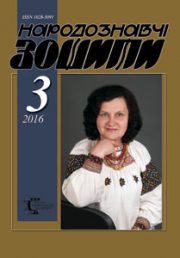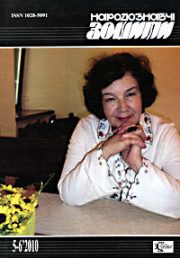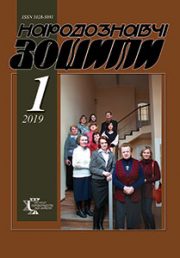The Ethnology Notebooks. 2019, 1 (145), 35—40
UDK 75.046.3(477.43/.44):27
DOI https://doi.org/10.15407/nz2019.01.035
К 59
FOLK ICONS OF THE EASTERN PODILLYA (BY EXHIBITION FROM THE COLLECTION OF ALEXANDER CHERNOV)
КОZINCHUK Vitalii
ORCID ID: http://orcid.org/0000-0002-8518-5686
Ph.D.
member of the National Union of Artists of Ukraine
leading researcher of
Precarpathian Art Museum,
2, Nizova str., 76000, Ivano-Frankivsk, Ukraine
Contacts: e-mail: br_vitalik@bigmir.net
Abstract. Ukrainian spiritual artifacts have been forbidden long time because of inconsistency with established fictitious samples of the so-called «Byzantine-Moscow canonical style». The article deals with artistic, cultural and theological peculiarities of the icons of Podillia. This is argued of the fact that they have many common features with the artistic heritage of the Western Ukrainian region. Icons of Podillia is a distinctive sample of folk art, which makes it possible to study the lifestyle and moral and ethical principles of the land of Podillia, so there is a need to speak about them.
Keywords: icon, art, Podillya, canon, paracanon, iconology, iconography.
Received 22.12.2018
REFERENCES
Bogomolets, O. (2017). Ukrainian Home Icon. Kyiv: Publishing House of Dmitry Burago [in Ukrainian].
Vasiliev, A. (1976). Erminia. Technology and iconography. Sofia: Septemviri [in Russian].
Yoann, Damaskynn. (2008). Three words in defense of icon veneration. Moscow: ABC [in Russian].
Chronicle of Ruthenia according to the Hypatian list. Retrieved from: http://litopys.org.ua/ipatlet/ipat.htm. (Last accessed: 2002).
Lukan, V.G. (2010). History of Ukrainian Art. Ivano-Frankivsk: PNU them. V. Stefanуka [in Ukrainian].
Mudryj, С. (1995). Essay on the history of the church in Ukraine. Rome-Lvіv: Publishing House of the Basilian [in Ukrainian].
Rovinsky, D. (1903). Review of icon painting in Russia until the end of the XVII century. St. Petersburg [in Russian].
Turcalo, J. (1974). Essay on the history of Ecumenical Councils. Brussels [in Ukrainian].
Shtepa, P.(2003). Muscovy. Drohobych-Lviv: Revival [in Ukrainian].







